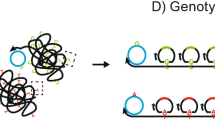Summary
p53 is one of the most frequently mutated genes in human cancers. Since p53 has been implicated in lymphatic and some myeloid leukemias, such as the blastic phase of chronic myelogeneous leukemia, we sought to address the role of p53 gene mutations within exons 4–9 in myelodysplastic syndromes (MDS), a myeloid preleukemic condition. In order to avoid the potential hazard of using radioactive single-strand conformation analysis (SSCP), we used a nonradioactive SSCP method based on the silver stain of small minigels. In cell lines with known point mutations of the p53 gene, aberrant migrating bands were found. Serial dilutions indicated a sensitivity comparable to radioactive methods. Furthermore, a common polymorphism within the 4th exon of the p53 gene was easily detected. However, of 17 primary samples from patients with MDS, none harbored a p53 gene mutation. We conclude that this nonradioactive method can easily be used to screen for p53-gene mutations, and that p53-gene mutations do not play a major role in the pathogenesis of MDS.
Similar content being viewed by others
References
Ahuja H, Bar-Eli M, Arlin Z, Advani S, Allen SL, Goldman J, Snyder D, Foti A, Cline MJ (1991) The spectrum of molecular alterations in the evolution of chronic myelocytic leukemia. J Clin Invest 87:2042–2047
Ainsworth PJ, Surh LC, Coulter-Mackie MB (1991) Diagnostic single-strand conformation polymorphism (SSCP): a simplified non-radioisotopic method as applied to Tay-Sachs B1 variant. Nucleic Acids Res 19:405
Bain BJ (1990) Leukaemia diagnosis. A guide to the FAB classification. Lippincott, Philadelphia
Buchman VL, Chumakov CL, Ninkina NN, Samarina OP, Georgiev GP (1988) A variation in the structure of the protein-coding region of the human p53 gene. Gene 70:245–252
Cheng J, Haas M (1990) Frequent mutations in the p53 tumor suppressor gene in human leukemia T-cell lines. Mol Cell Biol 10:5502–5509
Effert P, Neubauer A, Walther PJ, Liu E (1992) Alterations of the p53-gene are associated with the progression of a human prostate carcinoma. J Urol 147:789–793
Fearon ER, Vogelstein B (1990) A genetic model for colorectal tumorigenesis. Cell 61:759–767
Feinstein E, Cimino G, Gale RP, Alimena G, Berthier R, Kishi K, Goldman J, Zaccaria A, Berrebi A, Canaani E (1991) p53 in chronic myelogenous leukemia in acute phase. Proc Natl Acad Sci USA 88:6293–6297
Feinstein E, Gale RP, Reed J, Canaani E (1992) Expression of the normal p53 gene induces differentiation of K562 cells. Oncogene 7:1853–1857
Fenaux P, Jonveaux P, Quiquandon I, Lai JL, Pignon JM, Loucheux-Lefebre MH, Bauters F, Berger R, Kerckaert JP (1991) p53 gene mutations in acute myeloid leukemia with monosomy 17p. Blood 78:1652–1657
Fenaux P, Preudhomme C, Quiquandon I, Jonveaux P, Lai JL, Vanrumbeke M, Loucheux-Lefebvre M, Bauters F, Berger R, Kerckaert JP (1992) Mutations of the p53 gene in acute myeloid leukemia. Br J Haematol 80:178–183
Gaidano G, Ballerini P, Gong JZ, Inghirami G, Neri A, Newcomb EW, Magrath IT, Knowles DM, Dalla-Favera R (1991) p53 mutations in human lymphoid malignancies: association with Burkitt lymphoma and chronic lymphocytic leukemia. Proc Natl Acad Sci USA 88:5413–5417
Hollstein M, Sidransky D, Vogelstein B, Harris CC (1991) p53 mutations in human cancers. Science 253:49–53
Jonveaux P, Fenaux P, Quiquandon I, Pignon JM, Lai JL, Loucheux-Lefebre MH, Goosens M, Bauters F, Berger R (1991) Mutations in the p53 gene in myelodysplastic syndromes. Oncogene 6:2243–2247
Kastan MB, Radin AI, Kuerbitz SJ, Onyekwere O, Wolkow CA, Civin CI, Stone KD, Woo T, Ravindranath Y, Craig RW (1991) Levels of p53 protein increase with maturation in human hematopoietic cells. Cancer Res 51:4279–4286
Maniatis T, Frisch EF, Sambrook J (1982) Molecular cloning: a laboratory manual. Cold Spring Harbor Laboratory, Cold Spring Harbor
Mohabeer AJ, Hiti AL, Martin WJ (1991) Non-radioactive SSCP using the Pharmacia “PhastSystem”. Nucleic Acids Res 19:3154
Neubauer A, He M, Schmidt CA, Huhn D, Liu ET (1993) Genetic alteration in the p53 gene in the blast crisis of chronic myelogeneous leukemia: analysis by polymerase chain reaction-based techniques. Leukemia 7:593–600
Nigro JM, Baker SJ, Preisinger AC, Jessup JM, Hostetter R, Cleary K, Bigner SH, Davidson N, Baylin S, Devilee P, Glover T, Collins FS, Weston A, Modali R, Harris CC, Vogelstein B (1989) Mutations in the p53 gene occur in diverse human lumour types. Nature 342:705–708
Orita M, Suzuki Y, Sekiya T, Hayashi K (1989) Rapid and sensitive detection of point mutations and DNA polymorphisms using the polymerase chain reaction. Genomics 5:874–879
Slingerland JM, Minden MD, Benchimol S (1991) Mutation of the p53 gene in human acute myelogeneous leukemia. Blood 77:1500–1507
Sugimoto K, Toyoshima H, Miyagawa K, Hagiwara K, Ishikawa F, Takaku F, Yazaki Y, Hirai H (1992) Frequent mutations in the p53 gene in human myeloid leukemia cell lines. Blood 79:2378–2383
Tefferi A, Thibodeau SN, Solberg LA (1990) Clonal studies in the myelodysplastic syndrome using X-linked restriction fragment length polymorphisms. Blood 75:1770–1773
Unger T, Nau MN, Segal S, Minna JD (1992) p53: A transdominant regulator of transcription whose function is ablated by mutations occurring in human cancer. EMBO J 11:1383–1390
Yonish-Rouach E, Resnitzky D, Lotem J, Sachs L, Kimchi A, Oren M (1991) Wild-type p53 induces apoptosis of myeloid leukemic cells that is inhibited by interleukin-6. Nature 352:345–347
Author information
Authors and Affiliations
Rights and permissions
About this article
Cite this article
Neubauer, A., Brendel, C., Vogel, D. et al. Detection of p53 mutations using nonradioactive SSCP analysis: p53 is not frequently mutated in myelodysplastic syndromes (MDS). Ann Hematol 67, 223–226 (1993). https://doi.org/10.1007/BF01715051
Received:
Accepted:
Issue Date:
DOI: https://doi.org/10.1007/BF01715051




